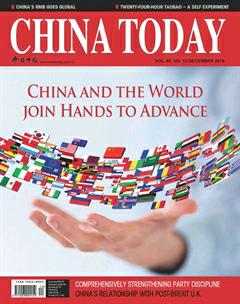Reforms Test Governance Capability
As the ruling party, the Communist Party of China (CPC) convenes the plenary session of the CPC Central Committee every year, when it announces new plans for governance. Over the past four years, the 18th CPC Central Committee has introduced specific plans to comprehensively deepen reform, govern according to law, build a moderately prosperous society, and strengthen Party discipline. This has been dubbed the Partys “Four-pronged Comprehensive Strategy” to deal with new international and domestic circumstances.
During the Sixth Plenary Session in October, the CPC Central Committee decided to strengthen Party discipline, in order to reinforce the other three comprehensive strategies, since the CPC is Chinas ruling party and leadership core, championing socialism with Chinese characteristics. It has played a crucial role in driving reforms to a deeper level, governing the country in accordance with the law, and building a moderately prosperous society. The CPC has been endeavoring to improve its governance capability and gain public trust through upgrading its supervision system and self-management so as to adapt to new social classes and altered social relations, changes in public administration and governance mode brought about by informationization, and a changing international political landscape. Therefore, “strengthening Party discipline” is of the greatest significance among the “four comprehensives.”
Reform and opening-up has been the basic state policy over the past four decades. Over the last four years, as Chinas reform has steered into a deep-water zone, the CPC has worked to propel and also enhance the capacity of the reform for self-purity, self-improvement, self-innovation and selfdevelopment. Reform remains an engine powering Chinas growth and also the necessary path for its development.
China has faced many challenges in the process of rebalancing its economy since the international financial crisis began. For example, it had to deal with the “middle-income trap” before it could celebrate its new status as a middleincome country. While cutting overcapacity and deleveraging to adjust the economic structure, the government has to ensure the wellbeing of its citizens and maintain job market stability. When it streamlines government administration, it must pay attention to procedural justice and governance according to law.
In China, there is a huge gap between the relatively rich eastern coastal zone and the poor central and western regions. A population of over 1.3 billion expresses different concerns and has diversified needs. A benign coordination between top-level policy design and a grassroots exploratory practice has helped the government overcome various obstacles to reform.
Over the last three years, it has become routine for the Central Leading Group for Comprehensively Deepening Reforms led by Xi Jinping to hold a meeting almost every month and discuss a wide range of topics. During a total of 27 meetings as many as 162 documents have been adopted.
Reforms that involve deep-level structural adjustment have been carried out, one by one, under the coordination and support of the top-level leadership. They mainly touched on the following fields: judiciary, finance and tax, the household registration system, salary of executives at state-owned companies, the college examination and admissions systems, rural land, public hospitals, and the scientific and technological system.
Reforms have enabled ordinary people to receive more benefits and lead better lives.
The targeted poverty relief policy will lift more than 50 million people out of poverty in the next five years. In May 2016, business tax was replaced with value-added tax. It is estimated that taxes will be reduced by RMB 500 billion or more this year, representing the largest scale tax cut since the convening of the 18th CPC National Congress.
In fields directly influencing peoples everyday life, an array of reforms has been introduced. To give people easier access to medical and healthcare services, a comprehensive reform of urban hospitals has been implemented and a family doctor service launched. Regarding education, there are plans to develop more world-class universities and build first-class disciplines, and efforts have been made to improve the conditions of schools in poverty-stricken areas and support rural teachers.
These reforms have brought practical benefits to the Chinese people, and have been a good test of the governance capability of the CPC.

